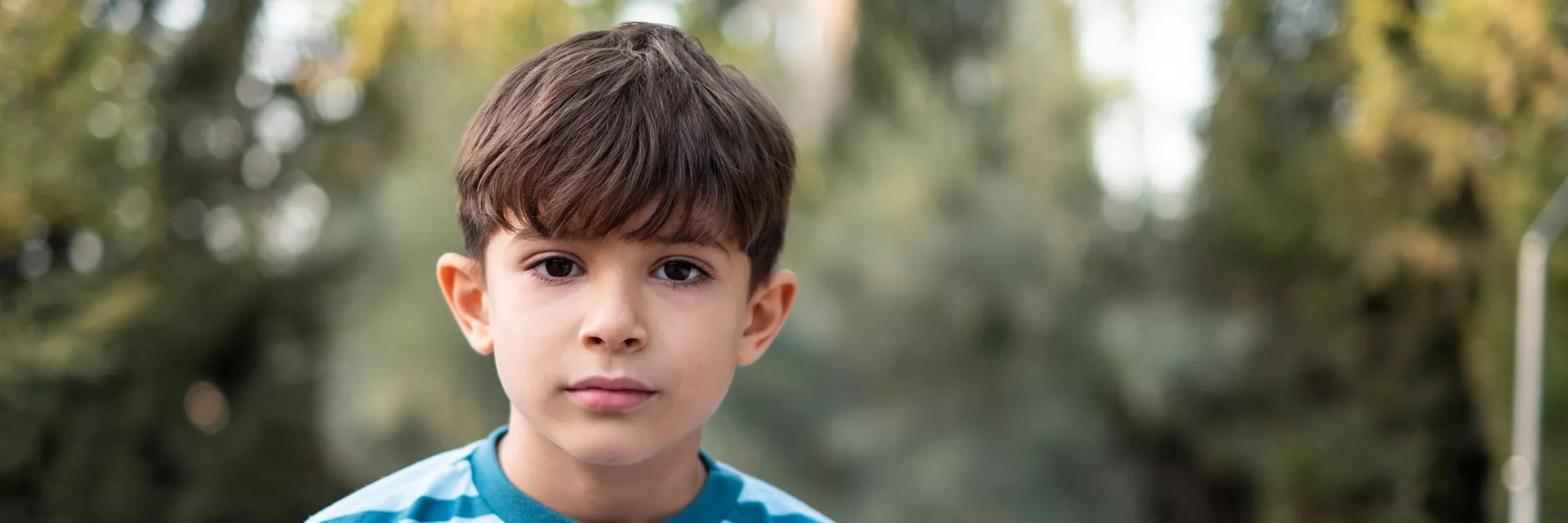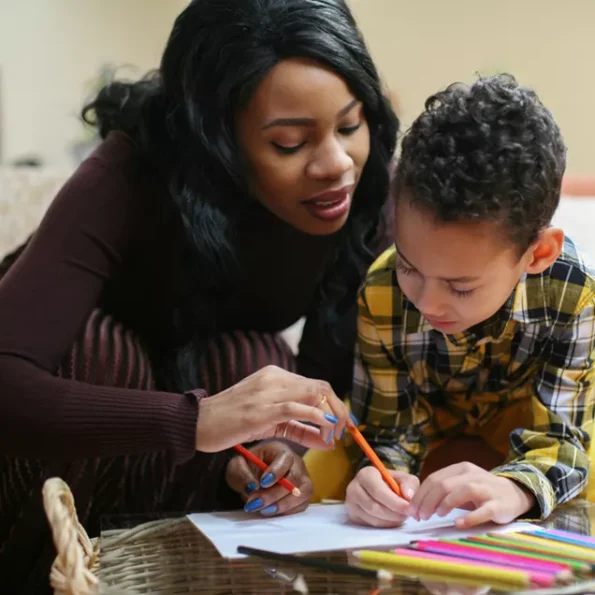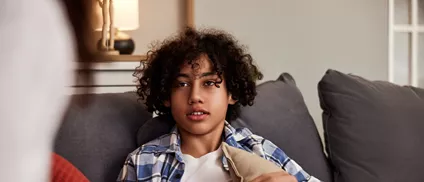
The impact of early childhood trauma and abuse
Discover the impact of child abuse and early childhood trauma, and what it means for young people in foster care.
When we think about the experiences that lead to childhood trauma, we’re thinking about overwhelming situations that exceed the child’s capacity to cope.
From their safety being compromised to witnessing a loved one getting hurt, the impact of early life trauma on brain development can be long-lasting and significantly impact a young person’s psychological well-being for a long time.
In this article, you will learn:
What experiences lead to early childhood trauma?
When a child is exposed to experiences that are perceived as scary or frightening, they can be left feeling lost, terrified and vulnerable.
We call these ‘Adverse Childhood Experiences’ (ACEs), and they lie outside the realm of your everyday ‘normal’. They are things that no child should have to go through or be expected to deal with on their own.
The types of experiences that can lead to trauma include:
- Physical abuse
- Sexual abuse
- Emotional abuse
- Physical neglect
- Emotional neglect
- Medical neglect
- A caregiver with chronic mental illness
- The death of a loved one Domestic violence in the home
- Community violence or gang culture
- Life threatening illness
- Medical procedures
- A caregiver with substance abuse
- Persistent bullying
- A serious accident or natural disaster
- War, terrorism or torture
When it comes to children in foster care, we need to remember that these early experiences that have led to trauma, have likely happened in the context of relationships with the very people they needed to depend on.
Their mum, dad, or another caregiver or trusted adult. The people that were meant to keep them safe have sadly been unable to, or given the child very inconsistent parenting.
When these early experiences are ongoing over a long period and are interpersonal in nature, this causes complex trauma, which can fundamentally affect how a child forms relationships, regulates their emotions and develops a sense of identity.
Child development and trauma
Children who grow up with positive experiences and healthy connections with their caregivers will:
- Want to explore the world around them and learn new things
- Learn that meaningful connections with others are safe and enriching
- Spend a small amount of time on survival – for example, learning that we do not touch plug sockets or put our hands in fire
However, when we focus on a child who has had to adapt to live in persistent danger, the initial impact of early life trauma is that:
- There’s not much room for exploring and learning about the world because the world is scary
- There’s not much space for connections because in their experience, relationships are something to be wary of.
- The majority of their focus is going to be on survival, so at a very early stage in their life, they will learn strategies that will help them survive.

Survival strategies
For children in care, strategies that helped them survive difficult experiences may unfortunately be received as maladaptive when they’re placed in a safe environment with a foster family.
Essentially, the things that helped them survive before – for example fighting, arguing, withdrawing, controlling, or placating – are now things that could get them in trouble or not be conducive to their trauma healing process.
This can lead to feelings of confusion, frustration, and worthlessness. Children may also feel a sense of isolation, guilt, shame and culpability for what they went through.
What’s wrong with me? Why do bad things happen to me? Why do people find me so difficult? Why is nothing working?
They are functioning in a different way and possibly at a different level to their peers – because they had to – and they can often sense that.
The impact of child abuse on child development – and other forms of ACEs – can be profound, affecting the way they develop and interact with the world around them, even as they continue to grow beyond childhood.
The impact of developmental trauma
Without the right support, developmental trauma can have a significant and long-lasting effect on young people, and the impact of child abuse and neglect can be far-reaching. Let’s take a look…
Emotional and psychological effects
Young people who experience developmental trauma may live with emotional and psychological difficulties.
Some may exhibit symptoms of:
- Anxiety
- Depression
- Complex post-traumatic stress disorder (CPTSD)
- Dissociative episodes.
They may also experience intense and unpredictable mood changes that can impact their life chances.
Not having the support of a trusted adult to help them regulate their emotions may leave them struggling with anger, aggression, anxiety, self-destructive impulses, and night terrors.
Others may have adapted by keeping all their feelings shut down or bottled up inside, whilst also being hypervigilant of the emotional states of the significant people around them.
Cognitive functioning
Developmental trauma can also impact cognitive development, leading to difficulties in:
- Attention
- Concentration
- Memory
- Problem-solving
This cognitive functioning can affect academic performance and hinder the overall learning and development of the child.
Social and interpersonal challenges
Young people who are living with trauma may struggle with forming and maintaining healthy relationships. Through experience, they may have learned that it’s dangerous to trust others and find relationships overwhelming.
The challenges they face can persist into adulthood and affect their ability to establish secure and fulfilling relationships.
Physical health problems
Developmental trauma can also have adverse effects on physical health. Chronic stress and trauma make the body adapt to defaulting at a higher state of alert, or conversely to shut down.
This can increase the risk of various health problems, including:
- Cardiovascular issues
- Immune system dysregulation
- Higher susceptibility to chronic illnesses
Risky and impulsive behaviours
Young people living with developmental trauma may engage in risky behaviours as a way to manage big feelings.
Seeking stimulation may be something they find soothing and familiar; after all, they may have adapted to survive a high-stakes environment early on.
Some examples might include:
- Substance abuse
- Self-harm
- Hyper-sexualization
- Involvement in criminal activities
These patterns can persist into adulthood and lead to a higher risk to health and life chances.
Self-esteem and identity issues
We develop a lot of how we see ourselves from watching how others treat us, especially those around us who we deem important when we’re young.
‘If I was treated badly, it must be because I am bad’
Developmental trauma can impact a young person’s sense of self-worth and identity. They may struggle with feelings of shame, guilt, and low self-esteem. This can impact their self-confidence, ability to assert themselves, and develop a positive sense of self.
Developmental trauma refers to the long-lasting impact of the adaptions a child has had to make in early life to survive chronic and repetitive exposure to adverse experiences during critical periods of a child’s development, such as neglect, abuse, witnessing violence, or living in unstable and unsafe environments.
The impact of trauma is unique to the individual
The impact of trauma varies from child and child. It depends on factors such as:
- The severity of the experiences that led to trauma
- The duration of those experiences
- Available support systems
- Other individual factors
Early intervention, trauma-informed care, and therapeutic interventions can help mitigate the effects of developmental trauma and support young people in their healing and recovery process.
The impact of child sexual abuse
Child sexual abuse can have a profound impact on child development. For example, it can:
- Disrupt a child’s development by introducing trauma, fear, and betrayal into their life.
- Affects their emotional well-being, leading to feelings of shame, guilt, and low self-esteem.
- Impacts their ability to form secure relationships and trust others.
- Affects cognitive development, resulting in difficulties with concentration, memory, and academic performance.
- Distorts their understanding of healthy sexuality, leading to confusion and potential long-term effects due to promiscuous and risky behaviour.
The physical and psychological consequences of child sexual abuse have far-reaching effects that can impact the child’s overall development and well-being throughout their life if left unsupported.

Signs of trauma in children in care
As a foster parent, it’s important to understand the many different signs of trauma so you can help the child in your care work through the impact of their experiences.
Please note that signs of trauma can vary from child to child, as children express their big feelings in different ways. They are also not definitive proof of trauma, as they can be indicators of other underlying factors, such as a learning difficulty or disability.
1) Holding onto survival strategies
Children will have mastered their survival strategies early on and will continue to hold onto these even when they’re in a safe environment.
Strategies may be big, bold and persistent to demand your attention, incredibly quiet to keep you at bay, or switch between the two.
2) Intense mood changes
Children living with trauma may experience intense and unpredictable emotions. They may experience frequent mood changes, high levels of fear or anxiety, or become easily startled or hypervigilant due to flashbacks brought on by certain triggers.
This cognitive functioning can affect academic performance and hinder the overall learning and development of the child.
3) Sleep disturbances
Trauma can disrupt a young person’s sleep patterns. They may experience:
- Nightmares
- Night terrors
- Difficulty falling asleep
- Bedwetting due to increased anxiety
Sleep disturbances can affect a child’s daily functioning and emotional well-being, which over time, can further compound the impact of trauma.
4) Avoidance and numbing
Children in care may try to avoid reminders of events that led to trauma. They may want to avoid certain:
- Places
- Activities
- Conversations related to their past experiences
They may also display emotional numbing or a limited range of emotional expression as a defence mechanism.
5) Hyperarousal and hypervigilance
Children with trauma may constantly be on high alert, exhibiting signs of hyperarousal and hypervigilance. For example, they may:
- Have difficulty concentrating or focusing on tasks
- Be easily startled
- Have an exaggerated startle response
- Have an increased sensitivity to sensory stimuli, such as loud noises or physical touch
6) Social and relationship difficulties
Trauma can significantly impact a child’s ability to form and maintain healthy relationships. Many children in care will have learned through their past experiences that connections are not safe or consistent.
Some may isolate themselves to avoid future disappointment, while others may need to be around you constantly to feel safe.
7) Academic challenges
Children living with trauma may find the expectations of school and environment challenging. They may find it difficult to concentrate and retain information, which can impact their academic performance.
Learn about trauma…

Trauma and the brain
Learn about the profound impact that childhood trauma can have on brain development.

Trauma and attachment
Explore how a child’s relationship with primary caregivers and those crucial early interactions can shape their attachment style.

Healing from trauma
Explore the strategies and therapeutic perspectives you need to help children recover from trauma.
